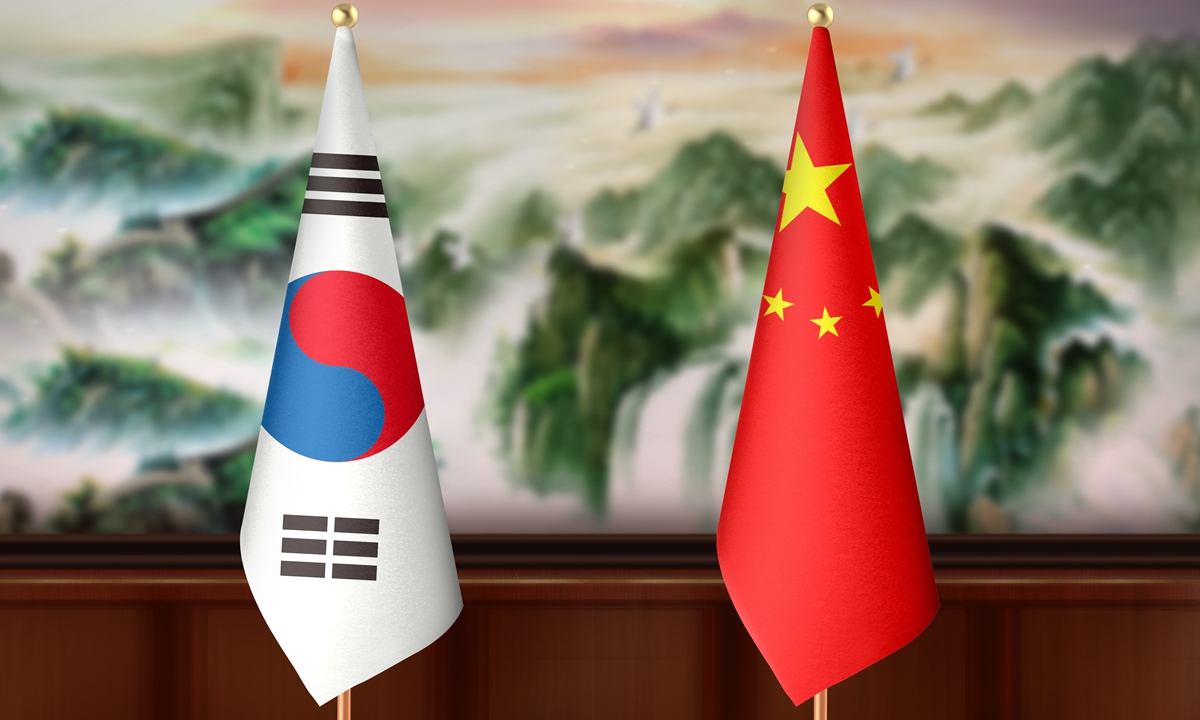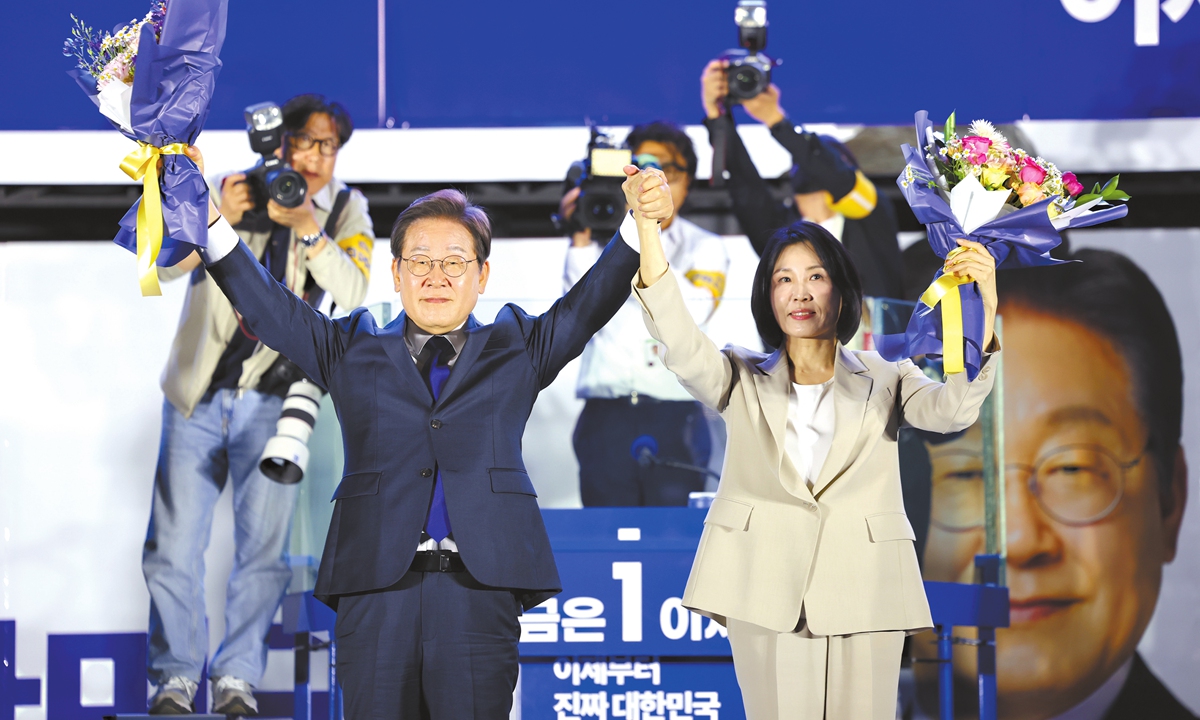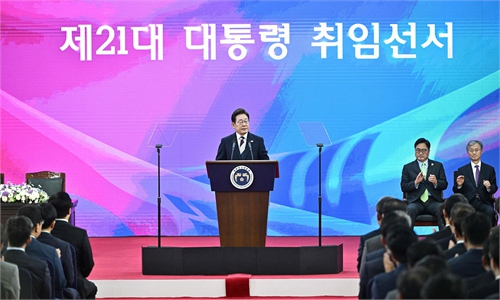Xi congratulates Lee Jae-myung on election as president of South Korea
China-ROK relations are propelled by common interests: Chinese Foreign Ministry

China-South Korea. Photo: VCG
Chinese President Xi Jinping on Wednesday extended congratulations to Lee Jae-myung on his election as president of South Korea, stressing that China stands ready to work with South Korea in jointly promoting the continuous development of the China-South Korea strategic cooperative partnership, according to the Xinhua News Agency.
Noting that China and South Korea are each other's important close neighbors and partners for cooperation, Xi said since the establishment of diplomatic relations 33 years ago, the two sides have transcended differences in ideology and social systems, moved forward hand in hand and achieved mutual success, realizing a stable and healthy development of bilateral relations, according to Xinhua.
This has not only enhanced the well-being of the people of the two countries, but also made positive contributions to promoting regional peace, stability, development and prosperity, Xi added.
The Chinese president stressed that he attaches great importance to the development of China-South Korea relations, Xinhua said.
In the world today, changes rarely seen in a century are unfolding at an accelerating pace and destabilizing factors in international and regional situations are increasing, Xi noted.
Both important countries in the world and region, China stands ready to work with South Korea to stay committed to the spirit that guided the establishment of their diplomatic ties, uphold good-neighborliness and friendship, and stick to the goal of mutual benefit and win-win results so as to jointly promote the continuous development of the China-South Korea strategic cooperative partnership, and bring more benefits to the two peoples, Xi said, per Xinhua.
When asked what is China's expectation for the South Korea's foreign policy towards China, and does China think that the new government of the ROK will improve China-ROK relations, Lin Jian, spokesperson from China's foreign ministry said on Wednesday that China-South Korea relations are propelled fundamentally by the two countries' common interests. The relations do not target any third party, and should not be disrupted by any third-party factor.
China opposes making countries choose sides and bloc confrontation. We stand ready to work with the ROK to pursue sound and steady bilateral ties to the benefit of the two peoples, and play a positive role in making our region more peaceful, stable and prosperous, said Lin.
Given that Lee has been advocating a more pragmatic diplomatic approach, some Chinese experts expect Beijing and Seoul to engage with each other on the basis of their strategic cooperative partnership to determine under what circumstances and in what areas cooperation should take place.
Despite the existence of US-South Korea alliance, the development of the South Korea-US relationship must not come at the expense of China's national interests, some experts said, who also noted that Lee's adjustment to South Korea's China policy may face external constraints such as continued pressure from Washington.

Lee Jae-myung and his wife Kim Hye-kyung celebrate at the National Assembly in Seoul, South Korea, on June 4, 2025. Photo: VCG
Policy priorities
Lee formally began his five-year term Wednesday after the National Election Commission (NEC) confirmed his election victory, the Yonhap News Agency reported.
Yonhap said Lee is expected to push to relocate the presidential office back to the Cheong Wa Dae compound once he takes office.
During his inaugural address, Lee shed light on his top priority: "We will begin by restoring people's livelihoods and revitalizing the economy," dedicating a considerable part of his inaugural address to tackling economic challenges and referencing the word "growth" 22 times and "economy" 12 times, the Korea Herald reported.
The Washington Post said on Wednesday that Lee's first task is dealing with the economic fallout of US President Donald Trump's tariffs.
Trade talks with the US will provide an early test of Lee's ability to balance foreign policy ties with domestic concerns, with exports equivalent to more than 40 percent of South Korea's gross domestic product, as Bloomberg put it on Wednesday.
On the diplomatic front, Lee reaffirmed his approach to relations with neighboring countries, including China and Russia, "from the perspective of national interest and pragmatism," while emphasizing the South Korea-US alliance as the cornerstone of foreign policy, according to the South Korean media report.
Regarding the election result, the White House said South Korea had a free and fair election, however, it hyped so-called "Chinese interference and influence in democracies around the world." In response, the Chinese Foreign Ministry urged the US on Wednesday to change its old habit of projecting its own behavior onto China, and stop sowing discord between China and South Korea.
"Strangely, when the White House commented on the outcome of South Korea's presidential election, it brought up the unfounded claim of 'Chinese interference and influence.' Such a remark is not only diplomatically inappropriate and disrespectful to bilateral relations between South Korea and US, but also seems intended as a preemptive warning or pressure on the new South Korean administration," Lü Chao, an expert on the Korean Peninsula issue at the Liaoning Academy of Social Sciences, told the Global Times on Wednesday.
Unlike previous Yoon Suk-yeol administration's emphasis on "values-based diplomacy," Lee and other progressive forces advocate handling affairs based on South Korea's national interests, maintaining a position grounded in national priorities and adopting a case-by-case approach, Wang Xiaoling, associate research fellow at the National Institute of International Strategy of Chinese Academy of Social Sciences, told the Global Times on Wednesday.
"Meanwhile, some voices within the progressive camp argue that South Korea should move beyond a binary US-China framework and prepare for an increasingly multipolar global order," Wang said.


